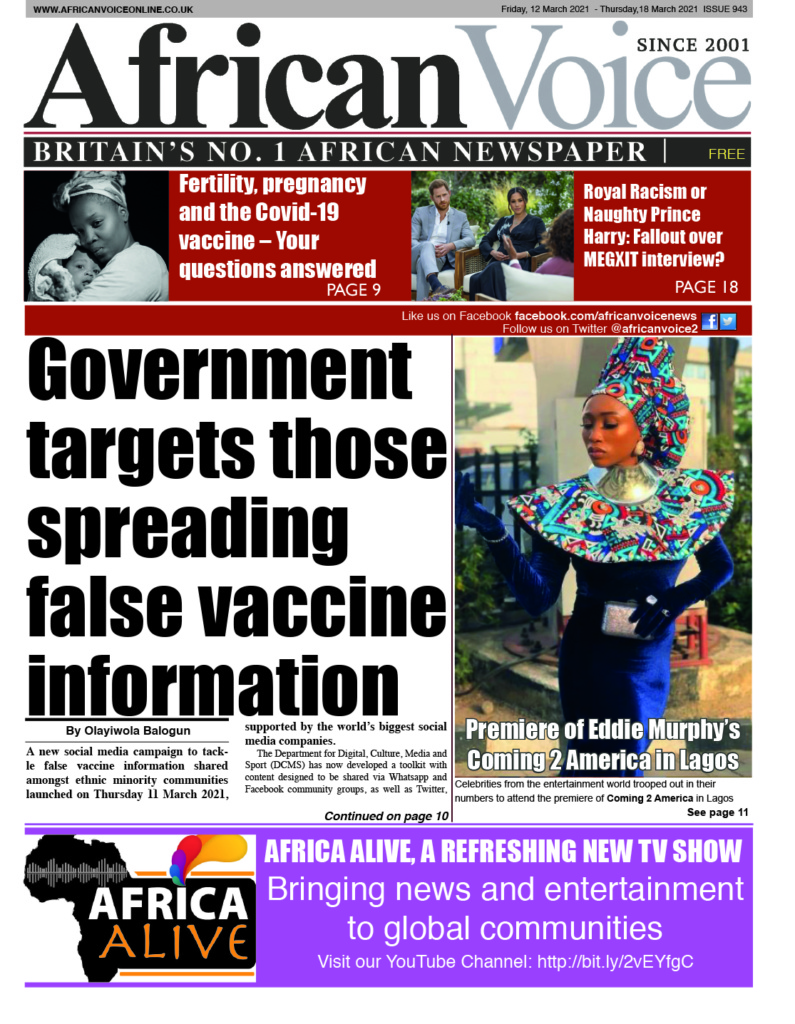
A new social media campaign to tackle false vaccine information shared amongst ethnic minority communities launched on Thursday 11 March 2021, supported by the world’s biggest social media companies.
The Department for Digital, Culture, Media and Sport (DCMS) has now developed a toolkit with content designed to be shared via Whatsapp and Facebook community groups, as well as Twitter, Youtube and Instagram, to tackle false information spread through private channels.
It follows concerns from the Scientific Advisory Group for Emergencies (SAGE) of low vaccine uptake amongst ethnic minority communities, and a recent Ofcom study which showed that people from a minority ethnic background were twice as likely as white respondents to rely more on people they know, people in their local area or people on social media for information about coronavirus.
The campaign is fronted by trusted local community figures such as imams, pastors and clinicians in short, shareable videos which include simple tips on how to spot misinformation and what to do to stop its spread, signposting to the NHS for the best source of information.
It is the first government campaign designed for private instant messaging services where there are concerns that false information about coronavirus is spreading – and that not enough has been done to tackle it, particularly where it could impact the take up of the vaccine.
Minister for Digital and Culture Caroline Dinenage said: “We want to harness the power of social media to tackle false information and encourage take up of life-saving vaccines among ethnic minorities.
“Our new toolkit and campaign will help people access reliable and factual information on vaccines and builds on the good work platforms are already doing to promote trusted quality information.”
Ministers have worked with platforms throughout the pandemic to ensure accurate and reliable information about coronavirus and life-saving vaccines is easily accessible, and to stop the spread of dangerous content. Facebook has introduced measures to better identify false news and social media platforms have committed to respond swiftly to anti-vaccine content, as well as the principle that no company should profit from it.
This new toolkit is based on the core principles of the government’s SHARE checklist, which encourages people to check where information has come from before they share it, to think critically about the facts and whether or not they are coming from an expert to make sure what they’re sharing is accurate.
Reverend Alton Bell, Senior Pastor at the Wembley Family Church, said: “As a faith leader and scientist in the black community, I’m lending my voice to this campaign because it is absolutely vital people get the facts about the vaccine, not rumours which could do them harm if they believe them. My message is simple: be aware of false information online and check before you share.”
Imam Qari Asim, Senior Imam at Makkah Mosque in Leeds and Chair of the Mosques and Imams National Advisory Board, said: “It’s natural that people might have questions about vaccines, but we’re seeing instances where they’ve relied on unfounded theories or fake news to make a decision to delay taking the vaccine.
“We want people to be aware of the false information that is being circulated on these platforms and make informed choices based on the information from the health authorities and faith leaders.”
Dr Onyinye Okonkwo, GP at the Wand Medical Centre in Birmingham, said: “I know that many members of the black community have concerns about the information being sent on social media about the vaccine. As a doctor, I understand that this information can be worrying.
“I advise everyone to check with a reliable source, such as the NHS website and spread the right information, not the virus.”
The move comes as Facebook launches the second wave of an on-platform ad campaign, in partnership with Full Fact, to educate people about how to spot false news online.
Rebecca Stimson, Head of Public Policy UK, Facebook, said: “Over the last year we’ve been connecting people with authoritative information about COVID-19 – directing over ten million visits to NHS and Government websites from Facebook and Instagram. As part of this new campaign we’ll be providing free advertising to leaders in communities where there are concerns about the vaccines, to help them widely share accurate information.
“During the pandemic we’ve removed twelve million pieces of harmful misinformation from Facebook and Instagram, and introduced limits on WhatsApp which have led to a 70% reduction in highly forwarded private messages.”
Katy Minshall, Head of UK Public Policy, Twitter, said: “At Twitter, we recognise the role the service plays in disseminating credible public health information. We continue to work with health authorities around the world – including the NHS – to ensure high visibility access to trusted and accurate public health information on our service, including about COVID-19 vaccines.
“We have continued to update our approach over the past year, and our most recent update means we will now apply labels to Tweets that may contain misleading information about COVID-19 vaccines, in addition to our continued efforts to remove the most harmful COVID-19 misleading information from the service. This continued investment builds on our existing work to guard against the artificial amplification of non-credible content about the safety and effectiveness of vaccines.”
Kindly follow us on twitter:@AfricanVoice2









